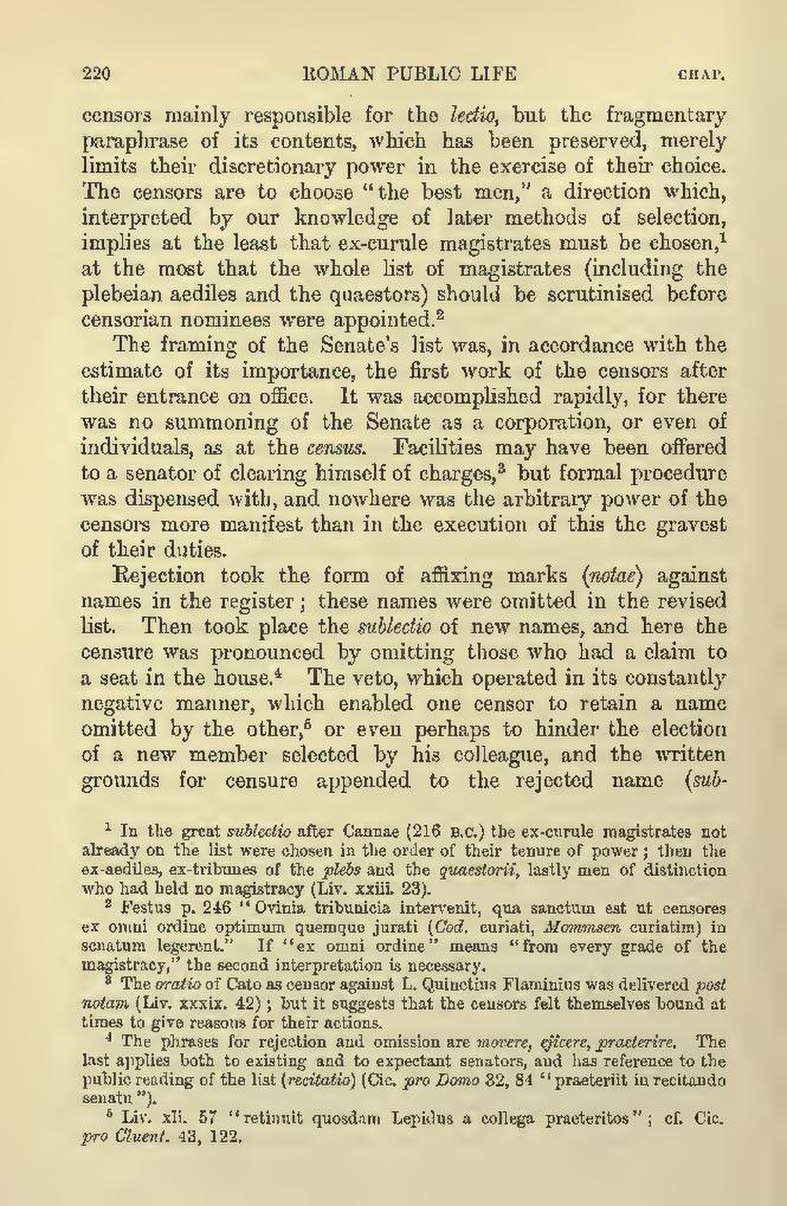censors mainly responsible for the lectio, but the fragmentary paraphrase of its contents, which has been preserved, merely limits their discretionary power in the exercise of their choice. The censors are to choose "the best men," a direction which, interpreted by our knowledge of later methods of selection, implies at the least that ex-curule magistrates must be chosen,[1] at the most that the whole list of magistrates (including the plebeian aediles and the quaestors) should be scrutinised before censorian nominees were appointed.[2] The framing of the Senate's list was, in accordance with the estimate of its importance, the first work of the censors after their entrance on office. It was accomplished rapidly, for there was no summoning of the Senate as a corporation, or even of individuals, as at the census. Facilities may have been offered to a senator of clearing himself of charges,[3] but formal procedure was dispensed with, and nowhere was the arbitrary power of the censors more manifest than in the execution of this the gravest of their duties. Rejection took the form of affixing marks (notae) against names in the register; these names were omitted in the revised list. Then took place the sublectio of new names, and here the censure was pronounced by omitting those who had a claim to a seat in the house.[4] The veto, which operated in its constantly negative manner, which enabled one censor to retain a name omitted by the other,[5] or even perhaps to hinder the election of a new member selected by his colleague, and the written grounds for censure appended to the rejected name (sub-*
- ↑ In the great sublectio after Cannae (216 B.C.) the ex-curule magistrates not already on the list were chosen in the order of their tenure of power; then the ex-aediles, ex-tribunes of the plebs and the quaestorii, lastly men of distinction who had held no magistracy (Liv. xxiii. 23).
- ↑ Festus p. 246 "Ovinia tribunicia intervenit, qua sanctum est ut censores ex omni ordine optimum quemque jurati (Cod. curiati, Mommsen curiatim) in senatum legerent." If "ex omni ordine" means "from every grade of the magistracy," the second interpretation is necessary.
- ↑ The oratio of Cato as censor against L. Quinctius Flaminius was delivered post notam (Liv. xxxix. 42); but it suggests that the censors felt themselves bound at times to give reasons for their actions.
- ↑ The phrases for rejection and omission are movere, ejicere, praeterire. The last applies both to existing and to expectant senators, and has reference to the public reading of the list (recitatio) (Cic. pro Domo 32, 84 "praeteriit in recitando senatu").
- ↑ Liv. xli. 57 "retinuit quosdam Lepidus a collega praeteritos"; cf. Cic. pro Cluent. 43, 122.
